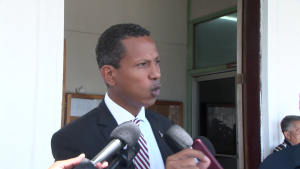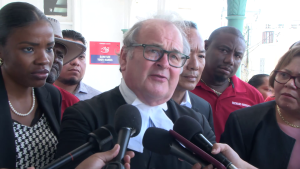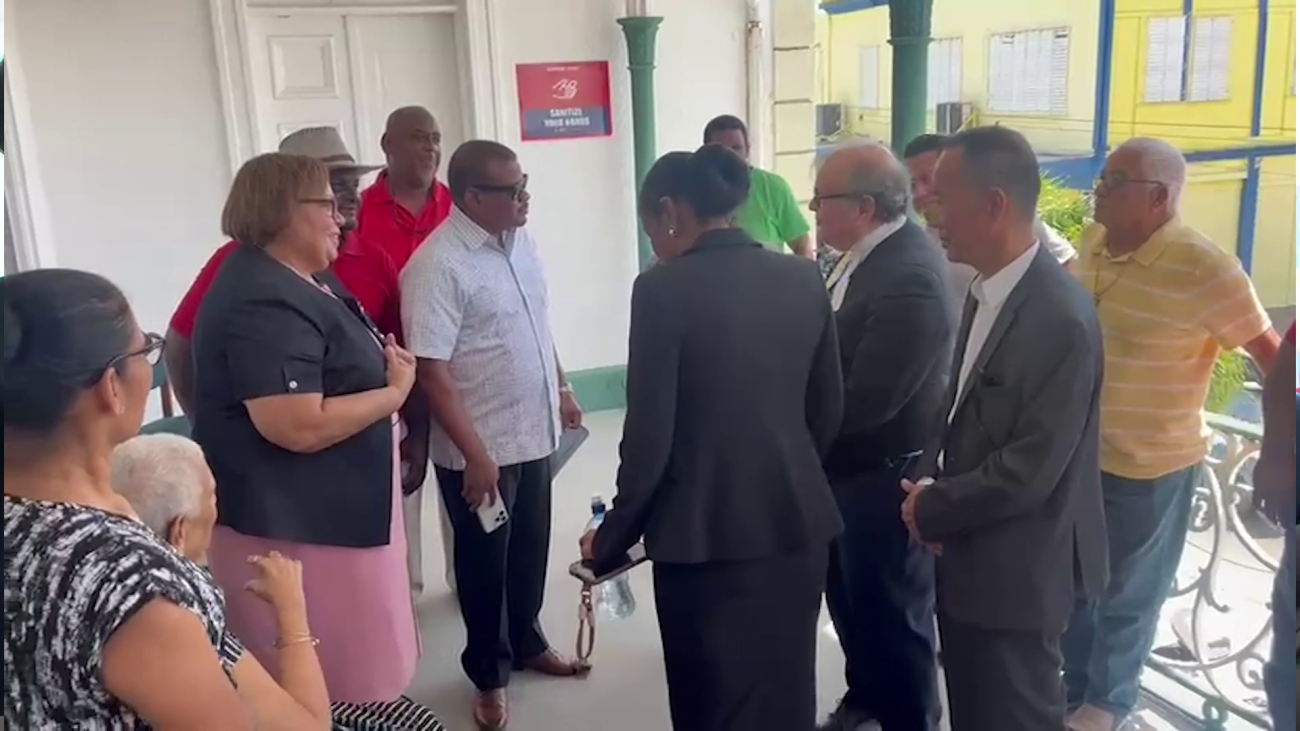Barrow and Panton Face Off in the High Court
Justice Tawanda Hondora’s courtroom was busy today with the legal battle between Moses “Shyne” Barrow and Tracy Taegar-Panton. Both sides brought in top-notch lawyers to argue their case about the October twentieth unity convention that took place last year, as well as the ensuing expulsions. Doctor Christopher Malcolm flew in from Jamaica to represent Barrow, while King’s Counsel Peter Knox came from the UK to represent Panton. Interestingly, Hugo Patt, one of the original claimants, has withdrawn from the case. With Barrow having already stepped down as party leader, is this just a matter of proving who’s right and who’s wrong? Panton thinks so, but Barrow argues that it’s about defending democracy and the rule of law. News Five’s Paul Lopez spent most of the day in the courtroom, listening to all the arguments. Here’s his report.
Paul Lopez, Reporting
Moses “Shyne” Barrow is moving forward with his case against Tracy Taegar-Panton and former UDP Secretary General, Phillipa Griffith-Bailey in the High Court of Belize. Despite losing the election on March eleventh and stepping down as leader of the UDP, Barrow is asking the court to decide if the unity convention on October twentieth, 2024, led by Panton, violated the party’s constitution. The court is also being asked to rule on the validity of Panton’s expulsion and that of several other members. Barrow was present at today’s proceedings, represented by Dr. Christopher Malcolm.

Moses “Shyne” Barrow
Moses “Shyne” Barrow, Former U.D.P. Leader
“I heard the learned Justice Hondora repeatedly question the defendants as to their contradictory position which is that the rules were not followed in regards to the expulsion of Tracy Panton, yet when it comes to the rules and the compliance necessary for the October twentieth event that they held, they are saying they didn’t have to follow the rules, once their right was being infringed upon themselves to do whatever.”
The courtroom was packed, mostly with supporters of Panton and her party executive. Representing Barrow, Malcolm argued that the October twentieth convention was held without proper authorization. He also pointed out that there’s no evidence showing that the delegates who voted at the convention were eligible to do so.
Moses “Shyne” Barrow
“Those who want to be prime minister of this country one day or to sit in Cabinet or the national assembly, we have to demonstrate to the public that we adhere to the rules of law and that we will be compliant with whatever oath of office we take.”
On the other hand, King’s Counsel Peter Knox contends that the UDP delegates have a right to vote and that such right cannot be taken from them. He argued that even though some members of the party executive distanced themselves from the convention, they still had a duty to uphold the delegates’ right to vote.

Peter Knox
Peter Knox, Attorney-at-law
“On the expulsion case we say the constitution is clear. There is no room for any doubt what it meant at all. To the point as whether Ms. Panton could call the convention, our point simply was that the constitution did not say one way or the other as whether she could or not, therefore she could.”
Reporter
“They are arguing that roles and functions are usurped and there was a breach of the contract.”
Peter Knox
“They are saying that. We say there is no breach. The reason we say that is because they were not doing what they were supposed to be doing, so of course Ms. Panton was entitled to give effect to the delegates’ rights the way she did.”
In one of his arguments, Dr. Malcolm pointed out that Panton didn’t involve the Secretary General in organizing the national convention. The Secretary General is responsible for validating the list of eligible delegates before a convention. Knox, however, countered this argument.
Peter Knox
“We had all the information anyway, we had, in practical terms, all the information she would have had. So we would have been able to communicate with all the people she would have been able to communicate with. Of course, if that had not been the case, the fact that we did not go through the secretary general might have been important. We say so what, we had all the information she had, so we sent out all the relevant information and minutes and agenda that she would have done, so why does it matter that she didn’t do it?”
Justice Tawanda Hondora has decided to reserve his ruling for a later date. But with Barrow stepping down as party leader and Panton being endorsed as the new leader, is this just an academic exercise to determine who was right and who was wrong? Barrow argues that there is real damage involved, as Panton’s leadership challenge led to him and many of his colleagues losing their seats.
Moses “Shyne” Barrow
“When the campaign was initiated against me, the key words were structure, rules, the constitution , we have to follow the rules, dictatorship, one person, a few people, the partly leader and the Chairman can’t do what they want. So, we need to see that all the way through for the benefit of the institution of the U.D.P.”
Attorney Knox says otherwise.
Peter Knox
“In one sense, they are a little bit moot, because in one sense Panton is the leader of the opposition. In practical terms she would say, for all intent and purposes, the leader of the U.D.P. So what is the point of this litigation when one of the question was who is the leader of the U.D.P. There was an issue about that before the general election, now in real life there is not an issue about that particular point at all.”
Reporting for News Five, I am Paul Lopez







Facebook Comments